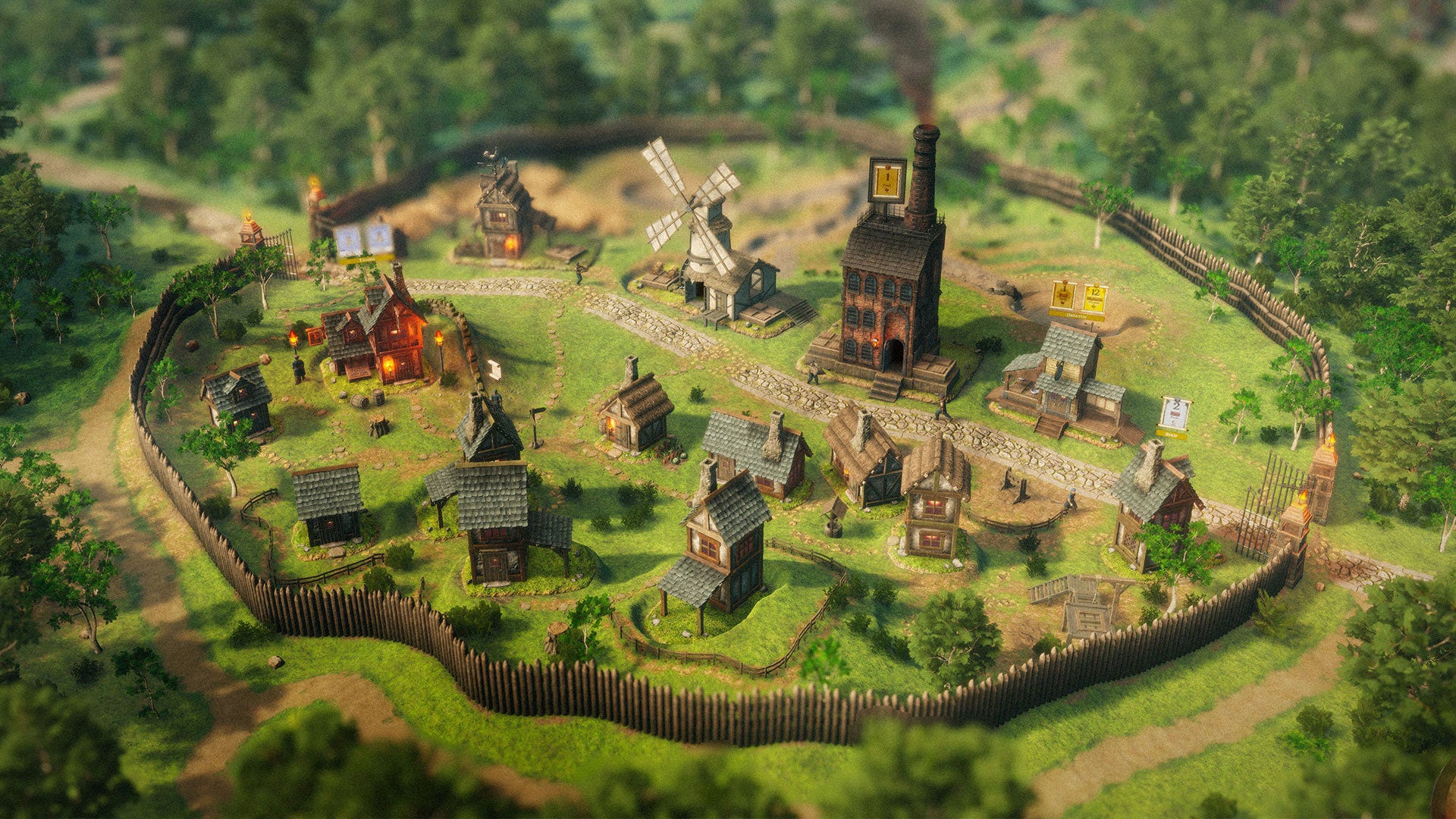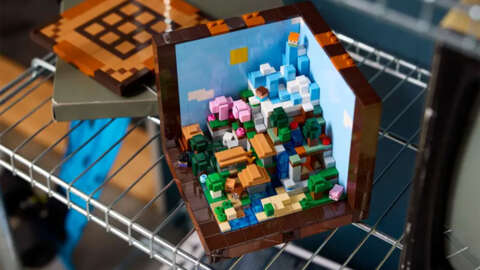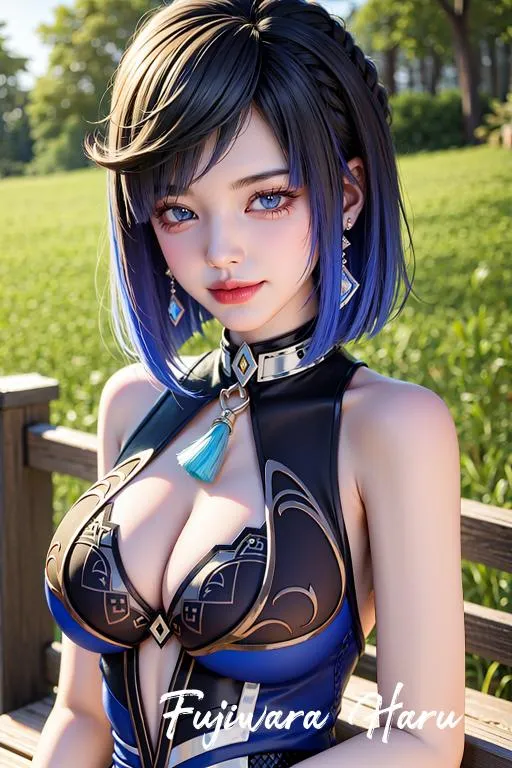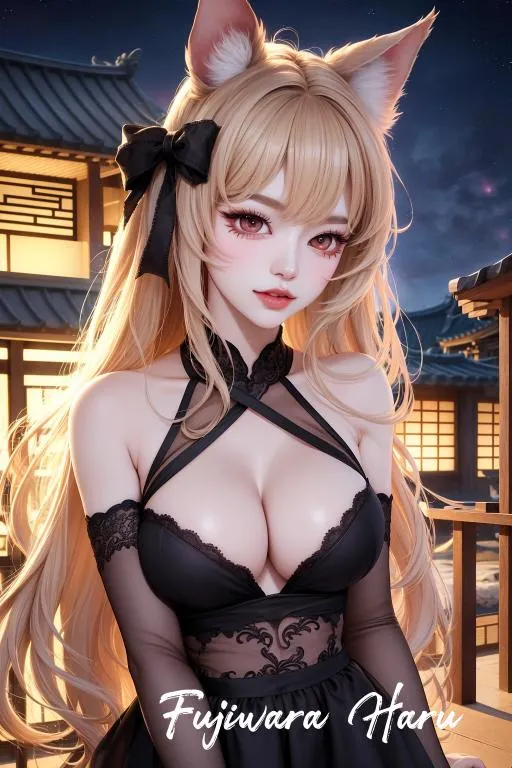The trailer for Masters of Albion, Peter Molyneux’s return to ‘traditional’ style games after a decade-plus stint in mobile development, welcomes you to “the familiar, vast world of Albion.” This world is, of course, the setting of Fable, the beloved RPG series Molyneux served as creative lead on at Lionhead Studios through the 2000s. But today he returns to Albion not to craft a new Fable (that’s Microsoft and Playground Games’ job), but to make something simultaneously new and nostalgic.
Masters of Albion aims to be something of a Molyneux Greatest Hits; a project that revisits ideas from many of the prolific designer’s past games and reinterprets them for the modern age. The result seems to be a mashup of Dungeon Keeper, Black & White, and Fable – a city-building god game that’s also a third-person RPG. Yup, Molyneux’s trademark wild ambition is definitely back.
It’s best to approach Masters of Albion one piece at a time. Let’s start with the god game stuff, born of the design DNA Molyneux created with Populous back in 1989. Played from an isometric perspective, you look after a growing population – building them up from a tiny village to a collection of bustling towns. Establishing supplies and constructing buildings form the basics, but there’s a variety of fun, very Lionhead-esque ideas, such as designing what your villagers will eat in a digital kitchen (with anything from soup and sandwiches to rats on the menu).

Crafting towns that are both economically and physically strong is vital. “We've got this very simple mechanic where by day everything's peaceful, you can explore, you can plan, you can build, you can create,” Molyneux tells me in an interview ahead of Masters of Albion’s reveal. “And then by night, everything will attack everything you own.”
Trolls, zombies, werewolves, and other horrors all descend as the sun goes down. And that’s where another familiar idea comes into play. Just like in Black & White, your avatar within the world is a giant floating hand that can cast miracles. Smiting foes with divine bolts of lighting and flamethrowers is just as important a task as using those deity digits to fit together houses and factories in build mode.
“I think the hand can be a lot more than just picking things up,” says Molyneux, referring to the more simplistic version featured in Black & White and his aims to evolve it for Masters of Albion. “I think we can enhance it. We can make people feel really powerful [and] creative with that hand.”
Eye in the Sky, Boots on the Ground
The short trailer revealed as part of gamescom 2024’s Opening Night Live doesn’t really detail how this next-generation hand has evolved beyond its 20-year-old predecessor. What it does show is a surprising callback to 1997’s Dungeon Keeper that promises to turn Masters of Albion into a wild genre hybrid.
“I loved the Hand [in Dungeon Keeper],” enthuses Molyneux. “I loved being able to pick things up. I loved being able to possess things, but it didn't feel like they comfortably lived together. [...] So what I decided to take is possession mode, but take it in a way that improves and enhances it, makes it meaningful and deep.”
In Masters of Albion, you can point at any living creature in your kingdom and take direct control of it. That could be a villager, a soldier, or even one of Albion’s beloved chickens. More likely, though, it’ll be your hero; a customisable character with their own RPG skill tree, weapons, and armour. They are, effectively, a Fable-like protagonist. And when you possess them (or, yes, a chicken), the camera drops from your eye-in-the-sky god perspective and swings behind them, settling into a familiar third-person camera.
“Possession enables you to play the game rather like the Fable combat system,” Molyneux explains. “You can use magic and you can fight, you can blend the two styles together.”
But possession mode isn’t just about taking command of a warrior to push back your enemies. “You can explore,” Molyneux explains. “And in exploring this vast land of Albion, inspired by Fable, which was inspired by old England, there are many, many places to explore and find.”

The world of Albion is shrouded by a fog of war in which your god hand has no power. It’s through the possession of your hero that you’ll explore what’s hiding in that fog, pushing the clouds back to unlock more and more land for your hand to interact with. And so the two modes depend on each other; you can’t build cities in god mode without exploring via possession mode, and your hero needs to be equipped with new weapons that must be forged in god mode (or, indeed, baked – that returning Fable sense of humour means you can send your hero to war with a baguette blade).
Importantly, Molyneux doesn’t want possession mode to feel like an optional extra. “You can play the majority of the game in that third-person view, which is fantastically exciting,” he says.
“I think my realisation after all these years is I don't want to create a game which forces you, the gamer, to be a certain sort of player,” he explains. “I want you to think, ‘Well, I'm not interested in god mode, I'm interested in possession mode, I'm interested in fighting, I'm interested in creating the armour and the weapons that my hero is going to use in possession mode.’ That's fine.”
Playing God in Old Albion
The demonstration of possession mode in Masters of Albion’s trailer is both impressive and clunky (perhaps to be expected; it is being developed by a lean 20-person team rather than a AAA studio, after all.) That considered, I’m cautious with my expectations. I can’t yet imagine this RPG side being totally fulfilling if played as the primary mode. But Molyneux and his team at 22cans have ambitions of working with the same RPG fabric that Fable was cut from. That means a significant relationship with the concepts of good and evil, with physical transformations based on your choices.
“Your hand will morph, your hero will morph,” Molyneux promises, a feature that echoes both Fable and Black & White. “The whole landscape will morph to reflect what you are doing.”

He hopes, though, that things will be much more nuanced than Black & White’s titular binary ethics. “We have these factions in the game, the Lords’ faction and the Commoners’ faction, and which you are going to support allows us to measure whether you are a person of the people or a person of the aristocracy. So there's a lot more interesting things going on.”
There are also systems that breed consequences not directly linked to any kind of moral ethos. “You can design whatever building you want and these buildings have functions, so you can make a building that's a farm and a mill and a factory and a pub and an inn and a housing block,” explains Molyneux. “And it can be one monstrous building. But be careful. The more you put things together, the more you stress those buildings, the more pollution they cause, and the whole landscape will morph to reflect the pollution you've got.”
Perhaps this is what Molyneux means by finding a way to be more nuanced – pollution isn’t quite as clear cut as, say, forcing children to work in factories and eat rats, but it’s still a philosophical issue that divides opinion.
Masters of Albion sounds like classic Peter Molyneux; a shoot-for-the-stars concept album of ideas from across the industry (or, at the very least, across the UK’s Guildford region where he has always worked). And with classic Molyneux comes ideas you can’t help but wonder if they could possibly work out. This time it’s a question of legality rather than scope: Albion is the setting of Fable, which is owned by Microsoft. So how are Molyneux and 22cans able to set this new game, unaffiliated with Microsoft, in Albion? Is it perhaps a different world, just with the same name?
“Fable was set in Albion, Masters of Albion is set in Albion,” Molyneux clarifies.
So this is the same world. And the reason 22cans can use Albion, at least according to Molyneux, is because Albion is the historical term for Great Britain. “[It’s] like saying if you set a game in America, you can't set any other game in America,” he says. “So Albion can't be copyrighted. It's the name for England and Wales and that's how we get away with it.”

By this logic, the argument seems to be that Fable does not take place in a fantasy world, but simply in historical England – a place that, despite the inclusion of comedy chickens, presumably cannot be copyrighted?
“I don't know if I'm honest, I don't really know,” Molyneux admits. “I hope so. I mean you would think that the responsible person I should be, I would've spent the last six months in lawyers' offices…”
If there are legal complications for 22cans to explore and resolve, they will come in time. For now, Molyneux’s mind is on exploring the untapped depths of the setting. “It's an interesting universe that Fable touched upon,” he says, “and really I think Masters of Albion extends and expands that.
“But it's not actually Fable 5 or anything like that,” he emphasises. “But if you've played Fable, then definitely Masters of Albion will be familiar to you. One of the things that we have got and we absolutely wanted a nail was the humour. I think in the Fable games, it's not so much about telling jokes, it's more about giving you, the player, the ability to do ridiculous and funny things. And we've got that in Masters of Albion in absolute spades. I think we’re really nailing that.”
Masters of Albion may not be a new Fable game, but it is a new spin on Fable’s world – a spin that reunites Peter Molyneux with the god game ideas that he built a career on. We’ll need to see much, much more of this strange genre hybrid before we can say if its ambitions are attainable, but it's nonetheless exciting to see one of gaming’s most prolific creators return with something so distinctly of his inventive mind.
Matt Purslow is IGN's Senior Features Editor.







